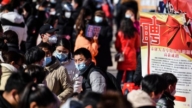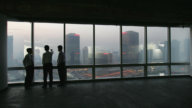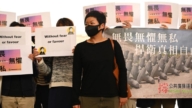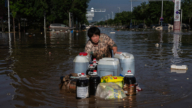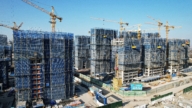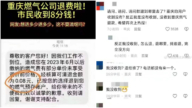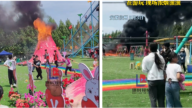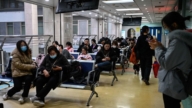【新唐人2011年5月10日讯】海外媒体近日发表文章,说在中国做刑事律师难。本台记者拨通了几位大陆刑事律师的电话,发现他们中就有人正承受着可能成为“第二个李庄”的恐吓。这是这么回事呢?中国的法律如何对待律师的呢?请看详细报导。
《纽约时报》5月6号发表社论,提出“中国刑事律师历来有“三难”之说,就是‘会见当事人难’、‘搜集证据难’、‘看检方搜集的证据难’。现在这一说法还要加上‘干刑事律师难’!”
自从上个月李庄案出现第二季追案,“大陆律师取证不受侵害”的问题再次在法律界引起强烈反响。原北京刑事律师李庄被重庆当局指控对证人眨眼睛来诱导对方做伪证,因而获狱一年六个月。
目前大陆的刑法第306条规定,“在刑事诉讼中,辩护人、诉讼代理人毁灭、伪造证据、帮助当事人毁灭、伪造证据、威胁、引诱证人违背事实改变证言或者作伪证的,处三年以下有期徒刑或者拘役。”
广西维权律师杨在新曾为民运人士、法轮功学员、被强拆人士等做法律辩护,多次受到不明身份者的殴打和陷害。
去年底,他担任一桩刑事案件的辩护律师。据杨在新的介绍,他去调查证人时非常谨慎,全程都录了像。后来在法庭上,当着公诉人、受害人和法官的面,证人所说的和他调查时是一致的。
但是,几个月前,中国新年期间,这名证人突然被警方逮捕。不久前,广西地方警察放出话来,要抓杨在新,办他个伪证罪。
杨在新:“是啊,现在就发生在我身上啊。可以说我准备挨坐牢的各方面东西都在准备了,比如说坐牢的衣服、拖鞋、牙刷都带着身上。你必须面对他们这种陷害你呀,你要受这个苦啊。”
杨在新立刻把相关的证据、录影等交到自己工作的律师事务所,并告诉了多位律师界朋友,万一自己成为“第二个李庄”,请他们想办法营救。
杨在新:“真的很恐怖,对法院作出公正的审判都是不利的。因为必须有公诉人举你的例子,辩护人有他的证据,双方的证据摆在桌面上,法官就可以根据双方的证据作一个判断。你现在把律师动不动就抓起来,特别是维权律师就更麻烦。”
杨在新认为,如果律师不敢取证维护当事人的利益,那么是全中国人民的利益都受到伤害。
杨在新:“我们认为是杀鸡取蛋,为了个别人的利益或者小团体的利益,就把中国律师正义感、对工作的负责任都毁了。毁了律师制度就等于毁了法律制度,也是毁了中国人民的整体利益。”
据不完全统计,自1997年以来,全国已经有数百名律师因所谓的“伪证罪”而遭受牢狱之苦。刑辩律师田文昌也曾感慨道:“在中国现阶段做律师是最难的, 比什么时侯都难,比哪个国家都难。”
新唐人记者赵心知、萧宇采访报导。
Chinese Lawyers Echo NYT Report
Overseas media recently reported on the difficulties
to work as a criminal lawyer in China.
NTD reporters took a few phone interviews
with Chinese criminal lawyers who might be
at a risk of becoming the next Li Zhuang.
How are such Chinese lawyers being treated?
New York Times reported on May 6 the 3 difficulties
a Chinese criminal lawyer has, i.e., meeting litigants,
collecting evidences and checking existing evidences.
Now there is a fourth: being a criminal lawyer.
New issues were raised after the Li Zhuang’s case,
such as lawyers’ immunity in evidence collection.
Former Beijing criminal lawyer Li Zhuang
was convicted by Chongqing authorities
to 18 months imprisonment for
“inducing witnesses to perjure by eye blinking.”
According to China’s Criminal Code, article 306,
in criminal lawsuits, defenders/legal representatives
shall be sentenced up to 3-year in prison
if they are found to destroy, forge evidence
or help a litigant do so, or intimidate
or induce the litigant to change testimony.
Guangxi rights lawyer Yang Zaixin was attacked
for defending rights activists, Falun Gong
practitioners and victims of forced demolition.
He was a defense counsel of a criminal case last year.
He said that he videotaped the whole process
in his research with the witnesses. In the court later,
in front of the prosecutor, the victim and the judge,
the witness said exactly the same as
what he found in the research.
A few months ago the witness was arrested by police,
and his family was questioned. A short while ago,
Guangxi police said that Yang Zaixin was wanted
for providing false evidence.
Yang Zaixin: “It is now happening to me.
I have now prepared the clothes, tooth brushes, etc.
In case I am jailed. I carry them with me. I have
to face such persecution, endure the hardship.”
Yang Zaixin has soon handed in all of his evidences
or videos to his law firm and asked fellow lawyers
to try rescue him in case he got arrested.
Yang Zaixin: “It’s terrifying, it is hard for the court
to carry out an unbiased trial because to be unbiased
both prosecutors and defenders need to present
evidences to the table and the judge can then rule
accordingly. But now lawyers are often arrested,
especially rights lawyers, for gathering evidences.”
Yang Zaixin noted that if lawyers themselves were
afraid of collecting evidences to benefit the litigant,
the interests of all Chinese people would suffer.
Yang: “We believe what the authorities did was
in the interests of some individuals or a small group,
but it has destroyed Chinese lawyers’
sense of justice and responsibility.
Ruining China’s lawyer system equates to
ruining its legal system,
and so are the overall interests of Chinese people.”
Hundreds of lawyers have been imprisoned
in China for the so-called “perjury" since 1997.
Criminal lawyer Tian Wenchang said that currently
being a lawyer in China is the hardest thing to do,
harder than at any time in Chinese history,
or in any country in the world.
NTD reporters Zhao Xinzhi and Xiao Yu



